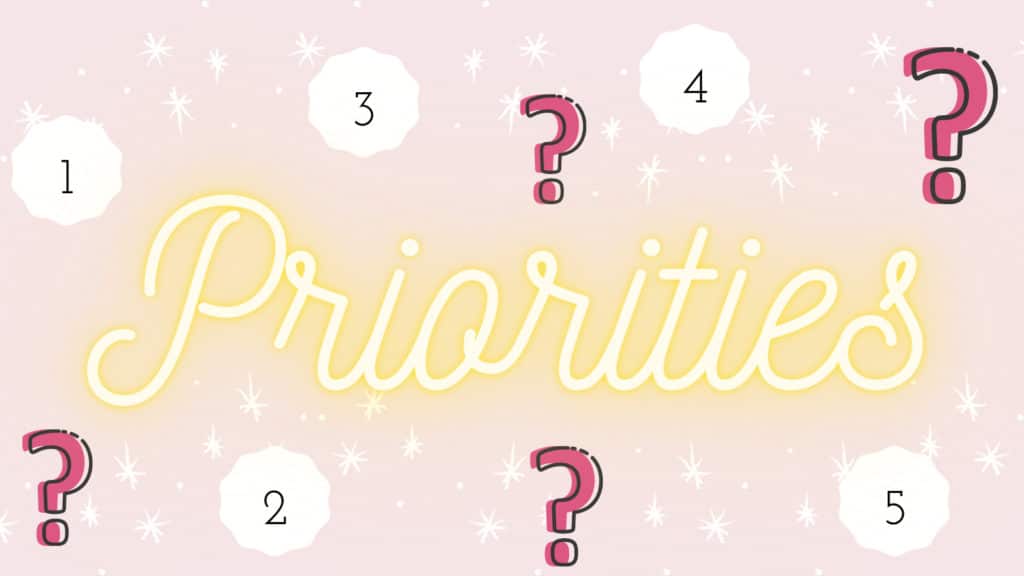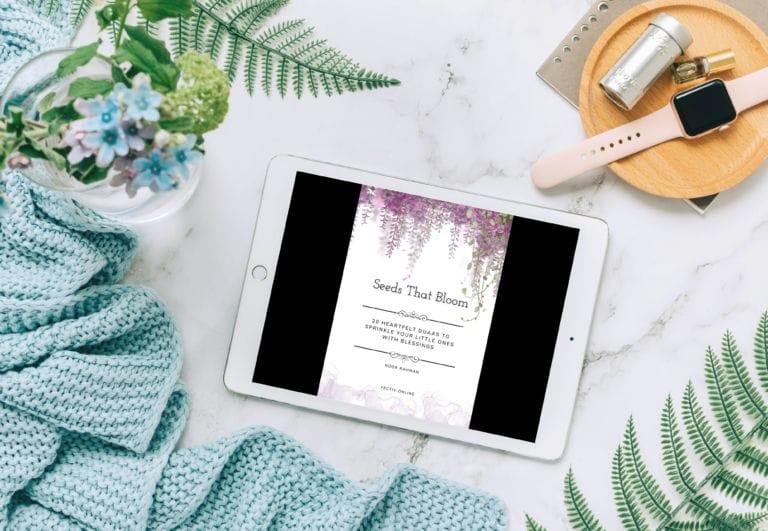
Only Your Priorities Matter
I used to say yes to every opportunity that came my way and shouldered others’ responsibilities until life spiralled out of control. No wonder I felt unsuccessful on most days. I later learned that being busy does NOT equal effectiveness.
We tend to pack our schedules to the brim thinking that we have to do everything possible. But the truth is that we can’t do everything or be an expert in every field. Why do our to-do lists always need to be filled up? How can we do anything well if we try to do everything?!
This is why we need to identify and focus on our priorities and cut everything else out. Yes, missing out on some things is actually a good thing. You don’t have to do it all. Prioritization is the best management of time, eliminates stress and frees our mental capacity to perform our tasks to the best standards. What can we possibly gain from being a sleep-deprived low-achieving zombie?

Our lives are jam-packed with a multitude of tasks and self-imposed responsibilities of which we end up achieving very little. Even though society seems to expect us to lead perfectly balanced lives, we need to reject and free ourselves from these unrealistic expectations. When we attempt to lead perfectly balanced lives, we won’t be able to divide our time and energy equally.
We need to get our priorities straight and do less to achieve more. Nobody can achieve every single thing. The sooner you come to terms with this truth, the sooner you can understand why it is important to focus on your priorities and the sooner you will be happier, in sha Allaah. Little progress in every field of life isn’t as great as being picky about what you do and making great progress in those fields and tasks.
How do you decide on your priorities? Different things are important at different times. Deciding what is worth your time and what isn’t has to be ongoing.
Instead of thinking about what you have to do or what people expect you to do, think about what you CHOOSE to do. If you don’t choose for yourself, others will choose for you. Choose what you think is best instead of trying to do everything.
- What is your purpose in life? The answer to this question is crucial in identifying your priorities.
- If your purpose is to attain Jannatul Firdaws, what is your plan of growth to achieve that? How can you get better? Imagine the best possible future and create a vision board (of inspiring images) of the steps that you’d take to fulfil your purpose.
- What are the core values that will take you there? Choose six words by which you would like to be described in your absence.
Formulate your priority list. Don’t succumb to your long to-do list and tackle all the minor tasks there. Identify where you want to spend your precious energy; start and focus on your most urgent priorities. Always think about whether something is essential before doing it.
Boredom can help. Yes. Seriously. When you have nothing to do is the perfect time to think about what you choose to do. ‘Thinking time’ is not a waste of time. It’s a necessity, not a luxury. If you have time to scroll through your phone, you have time to think.
Thinking can lead to greater effectiveness, creativity and concentration. You’ll also be able to solve problems better. You need this time to assess what is vital and what isn’t or you might end up spending your vital time on non-vital tasks. The Prophet Muhammad (sallallaahu alayhi wasallam) used to seclude himself in cave Hiraa.
If you don’t spend this time to zoom out and think, our brains fill this time with checking our phones and social media. The average person will spend 5 years and 4 months of their life on social media – don’t you think you can put this time to better use? Schedule thinking time with boundaries – no handling phone or email during this time.
Spending a few hours every day for thinking is a good way to help you focus on the bigger picture. It is an investment that yields incredible returns. You can also journal to aid you to think clearly about what are within your priorities.
How often do you take a break? Playing can free your mind, is an antidote to stress, can refresh us and help us prioritise tasks.
And sleep is even more important because it increases your ability to think and maximize effectivity during your waking hours. One hour of sleep can give you many more hours of increased effectiveness the following day.
You also need a 20-minute break every 90-120 minutes of work. Otherwise, the brain gets tired. In 1914, when Henry Ford reduced workers’ work hours from 9 to 8, Ford’s output actually increased.
When we get stuff done, we tend to feel energised and powerful – as if we can get everything done anyway. This is a trap. Not all tasks are important enough to seep into your to-do list. Be ruthless in cutting the unimportant away.
Sometimes, because we feel pressured to not disappoint the people in our lives, we worry that saying no might damage our relationships. But, failing to say no to things that don’t matter much can stop you from saying yes to what really matters.
Admit your errors, let them go and move on. Don’t get stuck continuing with decisions you know are wrong. If you know something isn’t working, don’t waste time and energy on it. Why try to save a sinking ship? Abandon it and find a different way.
Focus on what really matters, whether it is work-related or personal. It’s not about getting more done in the shortest time possible. It’s about identifying your priorities and staying focused on them without getting distracted. This is what effectiveness is all about. Focus on the quality of your work instead of the quantity and spend your time on what matters most. Don’t spread your focus thinly.
Set goals and write them down. Writing your goals is at least 10 times more powerful than not writing them. And writing goals, ideas and plans on paper is more effective than typing.
Once you’ve determined what your priorities are, you’ll need to execute them. Distractions like most phone calls, emails, social media and internet browsing are black holes that suck your time, even if they seem urgent.
If something is slowing you down, eliminate it. If they cannot be avoided completely, set clear boundaries. Boundaries can give your tremendous freedom and save you from being enslaved to these distractions. For example, you can set aside a block of time with a clear start and end time to check your emails. If you have people calling you during your focus times, kindly ask them to call later.
Know and accept that things won’t always go your way; prepare in advance. For example, if you’re travelling to work, leave earlier so that even traffic or any other hindrance on the way doesn’t stop you from reaching on time.
Do not multitask; the brain can tackle only one task at a time. Multitasking can drop your productivity by 40 per cent! Not just that. According to a study by the University of London, while multitasking, people’s IQs drop to levels similar to someone who has missed a night’s sleep. Multitasking can make you slower and produce poorer quality work. Focus on less to achieve more.
Lastly, take small steps. Small wins create momentum and confidence to keep going and can take you far. You’ll also need to set up routines for things like your household chores and finances. Though this can be challenging, good systems and routines can create positive habits.
Design a routine that aligns with your goals and stick to it. The more this routine becomes habitual, the easier and more automatic it’ll become.
Our brain consumes 20 per cent of our daily calories. Yup, it works very hard. Overworking the brain can make it lose energy and its ability to make good decisions. If you get into a routine and develop habits, you will get stuff done automatically without thinking. This can conserve your brain’s energy and allow it to focus on your priorities.
- When you want to build a habit, ask yourself why you want to do it.
- Decide on where, when and with whom you will be engaging in this habit.
- Predict excuses (like tiredness and how hard it is) in advance. And have a counter-excuse ready for the common excuses that you might come up with.
- Track your progress. You could use Google Sheets or any habit tracking app. Currently, I’m using HabitShare because it also allows me to keep an eye on my children’s habits.
- Rewards are very important. Rewarding yourself will make you remember the activity for the future. Once the habit has been formed, you won’t need rewards to motivate you anymore.
- Despite all your preparedness, be prepared to stumble. It happens all the time. But this is NO reason to quit. Pick yourself up and continue on your path.
Building habits is easy, but you DO need to spend some extra energy at the beginning. Once you’ve built any habit, you don’t need as much effort, energy or thinking to continue the habit.
I used to think routines were boring. But routines save brainpower and redirect it towards more important things. Routines should ideally be automated.
For example, you waking up, brushing your teeth, performing Salaah and making duaa might be your automatic morning routine. You can also design your routine based on your needs, priorities or household chores (like laundry) that simply have to be done to lead an effective life.
With routines, things get done automatically and reduce stress. It is beneficial if your kids can also follow a routine, even though it may take some time to train them, as this can free more of your time for your priorities. Break overwhelming projects down into monthly milestones. Automating your routine gives you space to be proactive with your priorities and simplifies your life.
Only our few priorities matter and everything else is unimportant. You’ll achieve more by doing fewer things, so delete as many tasks as you can. The more you declutter your mind and to-do list, the better you’ll do at your priorities.
Taking on so much also leads to stress. Use your purpose to guide you to define your priorities. Missing out on some things is the way to earn what really matters. Whenever an opportunity comes your way, think about why you’d want to take it on. Does it align with your purpose? If yes, do you have time for it? If not, are you ok with missing out on other important things for this one? Asking yourself such questions will give you much-needed insight.
Lastly, keep visualizing success and make duaa every day. You’ll get there in sha Allaah.
What is your opinion on focusing on and tackling your priorities first before adding more on to your plate? Please comment below.



